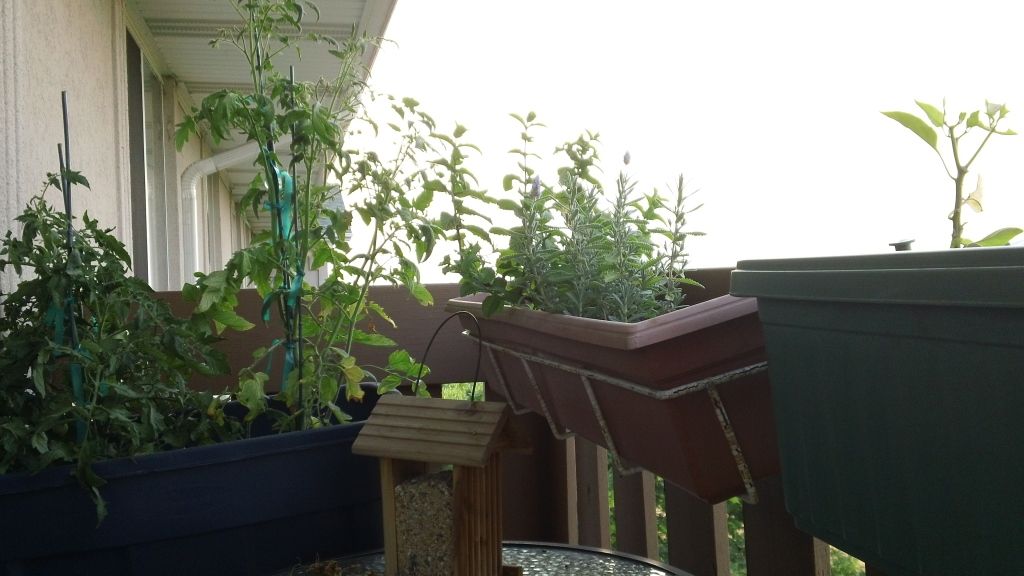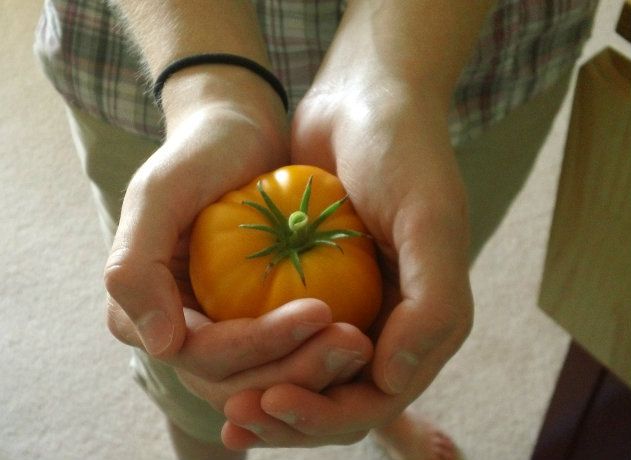Summer has been good to us this year. Check out the balcony garden:

Which so far has yielded several delicious tomatoes:

This being the first year I have attempted to grow anything, I am pretty pleased. I daydream about the day when I have a large yard, complete with clothesline and extensive garden. But until then, at least I can still practice honing my greenish thumb.
This week, as I mentioned in my last post, I have accidentally become saturated with the world of Little House. I say "accidentally" because while I did want to read Wendy McClure's memoir on her forays into Laura's real-life world, it was purely coincidence that Nathan and I started reading through the Little House series together at about the same time. I love introducing Nathan to these books, knowing that someday we will both be sharing them with our own children.
As a kid, my sister and I loved the Little House books. Actually, loved is probably not an accurate word. Exchange the "o" for an "i". We lived the Little House books. Making molasses candy on snow? Did it. Playing with our own corncob dolls? Check! Tying on sunbonnets and putting on prairie dresses to drag our little red wagon through our yard and woods? Every summer. So we were Little House girls, plain and simple.
When I was 14, my family and I went on a "Laura trip," hitting many of the sites where Laura lived in the books. We did not make it down to Kansas or Missouri, but we started the journey in Pepin, WI and drove over the Mississippi (while I imagined how on earth the Ingalls' managed to make it across.... on the ice.... in a WAGON). We explored the banks of Plum Creek near the town of Walnut Grove, MN and from there, drove on into DeSmet, South Dakota where we stayed in a cabin right on the shores of one of the lakes Laura and Almanzo drove by during their buggy courting outings. It was really the epitome of a book coming to life. Wendy McClure makes an observation that most of the worlds children love cannot be reached in real life- we don't have the option of visiting Narnia or Hogwarts or many other literary locations. But Little House is different, because it existed. It was real. It may not be a 100% accurate portrayal of Laura's childhood, but the places and the people are not very separated from us at all. Even at a young age, I was completely fascinated by how the history and the story in the books intertwined and separated to create a reality just as compelling as the stories in the books. Walking through Dakota prairie grass, under the trees that Pa planted, I realized that the books would always be different now, enhanced somewhat, since I could now see them through a clearer, sharper lens.
Which brings me to why I'm slightly upset with Ms. McClure. I loved the first chapter, which explained McClure's fascination with Laura as a child. I could identify with this chapter, for I too had imagined what it would be like to be Laura and to live where she did. As an adult, McClure rediscovers the books and becomes obsessed with finding out more. She decides to immerse herself in the Little House world, trying recipes (I can relate to this), going on a road trip to the Little House sights (a girl after my own heart), and discovering more about the facts of Laura's life. Up until now, I was mentally doing cartwheels as she makes these plans. But when she starts learning more about Laura's real life, and begins telling her readers the differences between reality and the world Laura created in her books, my patience began to wear thin. Perhaps it's the narrator's voice. Audiobooks can ruin a good book based on the narrator alone. But I have a feeling the negative, sarcastic tone would jump off of the page as well.
Unlike me, McClure is not a historian. Historical facts do not give her the same thrill. This is apparent within the first twelve seconds of sharing her new-found "discoveries." While I was excited to find out the truth about Laura's life, reading biographies and gazing at pictures, she seems to be appalled by the fact that the children's books were different than real life. Cue sarcastic tone. How could Laura not have mentioned that she had a baby brother? The Ingalls family actually had to live with their in-laws for a short time? What do you mean they had to work at a hotel in Iowa? These facts cause McClure to make erroneous and sarcastic statements, like stating that Pa obviously wasn't able to provide for his family all of the time, or it seems the Ingalls family weren't the Western-moving people they seem, or criticizing Laura's family tree because Pa's brother married Ma's sister. She is critical about the family's photographs too, as if she cannot believe these people were not made for the covers of magazines. The truth disillusions her, which is something I cannot understand or sympathize with at all. In addition, as an adult, she starts reading the books with a very anachronistic eye. She dubs Pa a racist and calls Ma a jerk because of their attitude toward the Indians in Little House on the Prairie. Instead of thinking about why Pa and Ma had the reactions they did based on the context of that era, McClure judges them by present-day standards. A big no-no in the historical world.
What it comes down to is that she has missed the point of Laura's books. They are not about whether every intricate detail is truth or fiction; they capture an essence, rather than act as a memoir. They focus on the love and commitment of family, on one girl's adventurous spirit, and on a way of life that was slowly becoming nothing but a memory. They are comforting and they are special for the simple reason that they engage our imagination and cause us to notice the life around us. One of my favorite quotes from Little House in the Big Woods sums up the poignancy of this series:
"She thought to herself, 'This is now.' She was glad that the cosy house, and Pa and Ma and the fire-light and the music, were now. They could not be forgotten, she thought, because now is now. It can never be a long time ago."
I still have a ways to go in the book, and I'm hoping McClure's trips to the Little House sites will change her attitude. Perhaps she, like Charlie Brown discovering the meaning of Christmas, will figure out what the Little House books are all about.
I never read these books as a little girl. I read them in 2010 for the first time and was very (very) put off by the attitude toward the Osage and Pa's attitude as a father, in Little House on the Praire. (Risking their lives to cross the river.) I think I'll feel differently if I reread. I wasn't reading as a historian though -- just a person. I adored all of the other books, but this one really, really gave me pause. I just didn't like it, which made me kind of sad. Maybe if I had first treasured it as a child, I'd feel differently. (Example, Gone With the Wind offends many people, but I treasure it because it grew up with me. Like a friend who was there for everything.)
ReplyDeleteWell said. I definitely agree that WHEN we first read a book influences how we perceive it ever afterward. While each reread can give us a new perspective, I don't think that initial perception ever goes away. I understand and agree about how some parts are offensive and even upsetting; however I have always been able to comprehend them within a historical framework and so they have never really bothered me. P.S. I love the line you wrote "like a friend who was there for everything." That is what the best books are to us. On that note, I also enjoyed your post about your relationship with Gone with the Wind. It was beautiful.)
DeleteThanks, Jillian. x :)
Delete